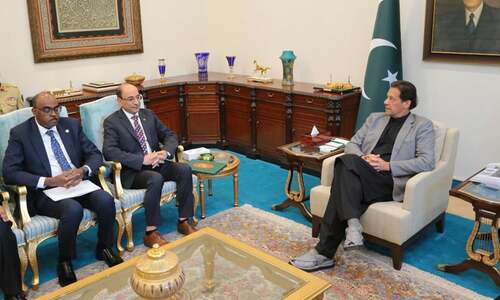Foreign Minister Shah Mahmood Qureshi said on Thursday that the Indian government was "losing the battle of hearts and minds" in occupied Kashmir.
Addressing a press conference alongside Special Envoy of the Organisation of Islamic Council on Jammu and Kashmir Yousef Aldobeay, who is on a six-day visit to Pakistan along with an OIC delegation, Qureshi added: "And you have witnessed in the neighbouring country to the west what happens when one loses the battle of hearts and minds."
Replying to a question, the foreign minister said he was a seeing a change in the people of Indian-occupied Kashmir.
The Indian government, he said, had created an impression that the situation was normal again in the valley.
"But the way they snatched [late Hurriyat leader] Syed Ali Shah Geelani's body dispelled that impression," he said, adding that had the Indian authorities not imposed restrictions, "a sea of people" would have been witnessed at Gilani's funeral. "It would have reflected the sentiments of the people, contrary to the Indian government's narrative."
And so, Qureshi added, the Indian government lacked the courage to let it happen.
"They were worried."
Giving the example of the Indian authorities slapping sedition charges on Kashmiri students after they celebrated Pakistan's win in the T20 World Cup match against India, Qureshi said the incident showed that the "paths of the people and government of occupied Kashmir were different".
OIC delegation's report
Qureshi also announced that Pakistan would be hosting the upcoming session of the OIC's Council of Foreign Ministers (CFM) summit in Islamabad in March 2022, where the Kashmir issue would come under discussion in light of a report prepared by the OIC delegation visiting Pakistan and Azad Kashmir.
The foreign minister said the CFM would draw conclusions on the matter in light of the report. The conclusions, he said, would include recommendations, on the basis of which the Kashmir issue would be highlighted at multiple forums, including the UN.
He added that he had shared with Aldobeay Pakistan's perspective on the issue and presented to him a picture of the ongoing situation in Indian-occupied Kashmir — the atrocities, injustices and torture being witnessed in the valley.
"And I explained to him how Covid-19 worsened the situation."
Qureshi said he also told Aldobeay that apart from a humanitarian crisis, the people of Indian-occupied Kashmir also suffered huge financial losses.
According to an analysis, Kashmiris in the valley had faced losses worth $9.5 billion, he said, without specifying the time period during which the losses were recorded.
"Tourism [in the valley] has been destroyed and means of earning have been paralysed," he lamented.
Criticising the Indian government for its actions in occupied Kashmir, he said following the recent steps taken by the Modi administration, distance between Kashmiris and the government there had increased.
He added that he wished that Aldobeay would be able to visit Srinagar in Indian-occupied Kashmir and interact freely with the media there, the way he was able to do it in Azad Kashmir.
Qureshi ended his address saying he was sure that the OIC delegation's visit would have increased Kashmiris' morale and the latter would be anticipating their report.
When it was his turn to speak, Aldobeay referred to an OIC Contact Group meeting held in New York earlier this year, where the need for the visit of an OIC delegation to Kashmir was stressed so as to develop a comprehensive understanding of the on-ground situation.
"As the foreign minister said, we will now be presenting our report to the CFM," he said, speaking through a translator.
The envoy termed the OIC delegation's visit to Pakistan and Azad Kashmir "very fruitful".
In response to a question, Aldobeay told media persons that the OIC had passed multiple resolutions on the Kashmir issue and Pakistan-India ties.
"We have also suggested forming new mechanisms for the resolution of the issue," he said, adding that he was hopeful that the CFM meeting would lead to fruitful results.
The envoy said that efforts were under way for an OIC delegation to visit Indian-occupied Kashmir.
To another question, Qureshi further explained that the OIC had taken a "forceful stance" on the Kashmir issue.
He added that the OIC was largest forum after the UN, "and when it agrees with your (Pakistan's) narrative, its adds up to the UN Human Rights Commission's reports [on the matter]."
This, he said, had led to the rejection of the Indian narrative, which shifted the blame for the unrest in Kashmir to Pakistan.
"Rejection of the idea that the freedom movement in occupied-Kashmir was linked to terrorism and acknowledgement [by the rest of the world] that India is no longer as secular is a big conversion and we need to build on this," he stressed.















































